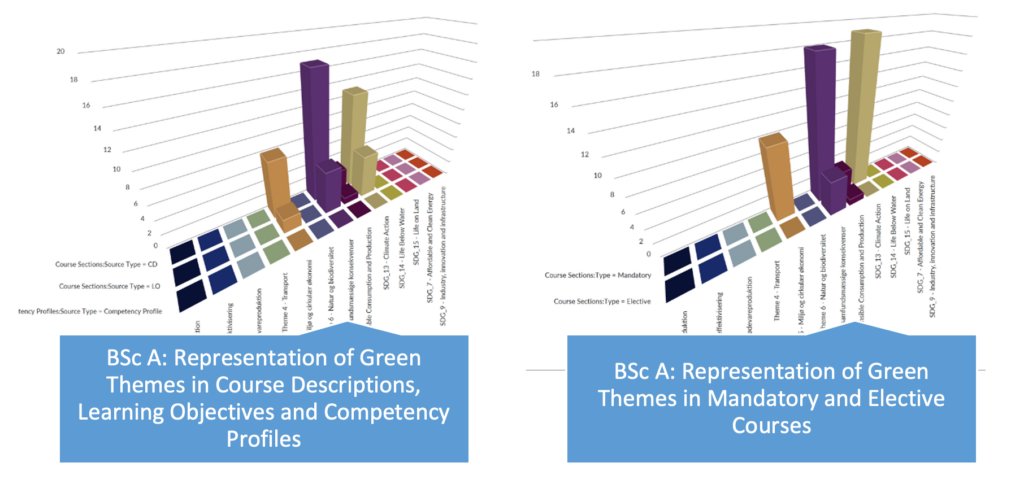By Lavinia Cristina Iosif-Lazar, Jens Riemer and Caroline A. Pontoppidan
“Environmental sustainability to be at the core of EU education and training systems” – So reads the latest recommendation from the European Commission to EU education ministers, which highlights that “learning for environmental sustainability is not yet a systemic feature of policy and practice in the EU.” How then do we better inform practice and policy? Where does one even start to look at what has already been achieved and what more needs to be done on environmental sustainability, especially in Higher Education Institutions (HEIs)?
Coupled with the complexities of incorporating sustainability in HEIs and the diversity of methods used by HEIs in advancing these efforts or curriculum overhaul, the task of bringing about systemic change and reaching the targets set on climate mitigation and biodiversity can seem daunting. But this is where a good picture of where we are now and where we want to be, can make a difference.
Global pollution of, among other things, air, soil, and water, increasing exploitation of the resources of the Earth, and global climate change are challenging nature, environment, and public health. Also, Denmark and the world are in the midst of a biodiversity crisis caused by man-made pollution and exploitation of natural resources and habitats, global spreading of invasive species, and climate change. The intensive exploitation of the open land, forests, coastal zones, and marine areas has caused nature to be fragmented and continuously exposed to a number of stress factors, which means that biodiversity is on a constant decline
(p.17)
The EU Context: broadly speaking, all education needs to be green
At the EU level, we do not lack initiatives that have brought into focus the greening of the curriculum and the need to address climate and environmenal issues at all levels of education and training. The European Education Area (EEA) is an initiative aimed at strengthened collaboration between European Union Member States to build more resilient and inclusive education and training systems. One of the five focus topics of the initiative centers on Green Education. GreenComp – The European Sustainability Competence Framework developed by the European Commission was one of the cornerstones in the educational scope of the European Green Deal. Published in January 2022 and aimed at providing a shared competence framework on sustainability to guide educators and learners, the framework can be used by member states as a reference when rolling out educational initiatives on sustainability.
However, even with all the attention given to education initiatives, there is little direct appealing to HEIs at the EU policy levelMost of the time, communication is directed towards the whole sector leaving the specific directionality of the initiatives to the individual Member States and HEIs are most often mentioned together with schools and other training institutions. The GreenComp report mentions Higher Education a few times but only to illustrate that Higher Education has succeeded in creating a focus on competences for environmental sustainability in relation to preparing the students to address sustainability challenges and opportunities in their working life.
The Danish Context: The Danish Ministry of Education and the Green Transition
In September 2020, the Ministry of Higher Education and Science, Denmark, published ‘Green solutions of the Future’, a strategy for investments in green research, technology, and innovation. It also highlighted the important role of close collaborations between knowledge-institutions and the business community. To get things moving, the Danish government decided to allocate research funds to boost green research and also bringing more focus on green study programmes.
And the issue of what was happening in HEIs on green research quickly became a focal point. In December 2021, the Danish Ministry for Education and Science sent a request for data on the work HEIs were doing to integrate green themes in educational programmes. The Ministry asked institutions to submit an overview of seven green themes and the coverage of those themes in their programmes. Among these themes, two were focused on energy production and effectiveness, and the others addressed agriculture, transport, environment, biodiversity and sustainable behaviour.
The CBS Context: Green Themes in study programmes
There are multiple ways in which HEIs can find out what content in their educational offerings addresses the green themes described by the Danish Ministry. The way in which CBS did it, was to build on already initiated course content analysis and expand it to include the seven themes. In the academic year 2021-2022, CBS offered 18 Bachelor (undergraduate) programmes, 36 Master (graduate) programmes, as well as HD, Executive and special Master programmes. This amounts to a lot of data to go through and analyse. Other universities or schools might face the same issue of data being both diverse and difficult to gather, but once it is gathered, the managing the amount of data can become a challenge.
CBS used the qualitative research tool NVivo, to analyse and code data from courses in all CBS’study programmes. This was done by identifying specific key words related to the given seven green themes (see table below). The data collected was derived from study programme competency profiles, course descriptions and learning objectives. For every search result returned, the context was analysed and only relevant hits were then recorded in the respective codes.
| Theme 1 | Theme 2 | Theme 3 | Theme 4 | Theme 5 | Theme 6 | Theme 7 |
| Energy production | Energy effectiveness | Agriculture and Food production | Transport | Environment and Circular economy | Nature and Biodiversity | Sustainable behaviour and Societal consequences |
How do Green Themes look like in a study programme at CBS?
Once the data was collected and the content analysed, a relatively comprehensive picture emerged of how and where the green themes are present in a study programme at a European business school like CBS.
Case 1 below, illustrates a visualization of an anonymised bachelor programme. It presents how the seven green themes can be visualized so to give an “as is” picture. With this information, study programmes can dive deeper into the green content that they already have embedded in their programmes and/or identify that they are interested in additional integration of the seven environment themes into education.

Bachelor Study Programme A had extensive coverage of Green Themes 5 through 7. The numbers in each cell of the below table represent the number of hits (keywords) per theme. Within the Bachelor Study Programme A, the green themes were identified in both mandatory and elective courses, in their respective course descriptions (CD) and learning objectives (LO). Environment and Circular economy, Sustainable development and Social consequences, as well as Nature and Biodiversity were the themes found represented in the Bachelor Study Programme A courses.
The continuous loop: research, policy, strategy and the classroom
The analysis and reporting of course content on green and environmental themes can function as a basis on which discussions about environmental sustainability in an institution’s educational activities can be taken. Getting this overview can inform further work to advance both content and scope that strengthens the advancement of environmental sustainability competences. These can later also find their way into regional strategies as well as inform policy makers at the International and European level. Having a well-informed stance on how, where and which environmental content and competencies HEI graduates obtain during their education can highlight where efforts need to be targeted. This also means that HEIs become a part of the action on “greening” the curriculum and, in turn, can better inform policy makers and education initiatives.
The business school sector has much to build upon. Pioneering scholars have long focused on issues of the environment and sustainability. There has been a dramatic uptake in the last decade of attention to climate change by business scholars, encouraged by editorial statements and special issues in the leading journals in every one of our disciplines. In the classroom, these issues are increasingly being discussed in core and speciality courses, representing significant curricular shifts, and supported by our accrediting bodies
(Galdon et al., 2022)
To read the full report, please visit CBS PRME InFocus Report series: https://www.cbs.dk/viden-samfundet/indsatsomraader/principles-responsible-management-education/resources/prme-infocus-reports
References
Bianchi, G., Pisiotis, U. and Cabrera Giraldez, M., (2022). GreenComp: The European sustainability competence framework, Punie, Y. and Bacigalupo, M. editor(s), EUR 30955 EN, Publications Office of the European Union, Luxembourg, 2022.
Danish Ministry of Higher Education and Science (2020). Green solutions of the future – Strategy for investments in green research, technology, and innovation.
Galdón, C., Haanaes, K., Halbheer, D., Howard-Grenville, J., Le Goulven, K., Rosenberg, M., Tufano, P. and Whitelaw, A. (2022) Business Schools Must Do More to Address the Climate Crisis.
About the Authors
Lavinia Cristina Iosif-Lazar is a project lead on Principles of Responsible Management Education at the CBS Teaching & Learning Department. Lavinia’s work centres on curriculum development, climate and carbon literacy and systemic thinking in management education, as well as assisting in the development of teaching materials.
Jens Riemer is a Green Transformation Officer at Copenhagen Business School, within Executive Support and Communcations. Jens works with the cross-cutting strategic initiative Green Transition, which focus on bringing together key players in establishing an organizational frame and initiate concrete problem-based research and educational activities.
Caroline A. Pontoppidan, Associate Professor department of Accounting & Academic director CBS PRME. Her research often engages with the institutionalization of global standards into local context – and challenges herein.
